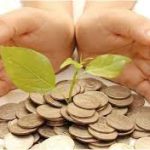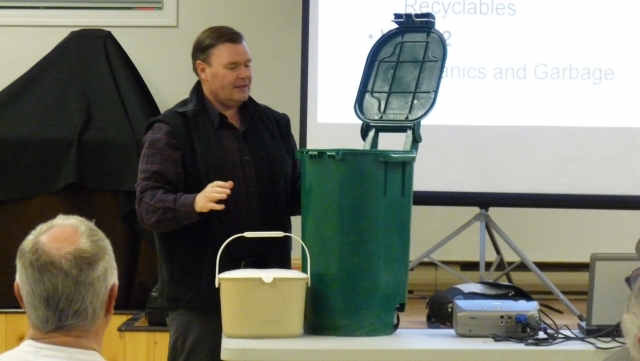Organic waste diversion proposed for Grand Forks and Christina Lake
Tired of the pungent smell of burning barrels in your neighbour’s backyard? Well, a new garbage and organic waste diversion program being proposed by the Regional District of Kootenay Boundary (RDKB) may well be the solution. The new program, to be piloted in Grand Forks, Christina Lake and rural areas soon, may be a godsend to those who have struggled with composting, recycling and even garbage. “I don’t know if many of you get excited about garbage,” joked Alan Stanley, director of environmental services for the RDKB, “but I do! It is one of the few truly regional services that we offer. We are proposing a program to get organic waste out of the garbage. Forty – 50 percent of what you put in the garbage can is organic waste.” Reducing organic waste will lengthen the life of the local landfills, but also reduces methane gases which build up when organics are not composted separately. Stanley said that in the Grand Forks waste shed there are three problems: self-haul recycling; burning in barrels in rural areas; and methane from the organic waste in the landfill. “The problem with burn barrels is that low temperature incineration releases dioxins. These dissipate into the air and then drop on plants which are then eaten by foraging animals. The animals accumulate dioxins in their fatty tissues. Then we eat the animal or their eggs, milk, etc. – we’re eating dioxins!” explained Stanley. The solution? Organic separation, residuals collection, and improved recycling. While it may seem that there will be resistance to the proposed collection services, Stanley says that in other areas that have implemented similar programs the uptake is higher than expected in every case. “In self-haul recycling 30 percent of recyclable materials still end up in the garbage,” said Stanley. “If you have pick-up services that number drops to 16 percent.” And you would be surprised that organic compostables include many paper products as well. The organics will be composted at the landfill using a simple system of goretex sheets trapping heat with perforated pipes moving oxygen into the piles. Stanley anticipates that there could be $50 – 100,000 in carbon credits that come from the project which helps the region in approaching their carbon neutral goals. But currently garbage pick-up is only in the City of Grand Forks, and recycling pick-up, while throughout the valleys, does have a few spots it can’t get to yet. This new program will provide all three services rotating on alternate weeks. In week one there would be organic waste and recycling pick-up and in week two organic waste and garbage. The service will provide every home with a green organics collection bin, as well as a small bin to collect organics inside the home. The increased cost to the regional residents will be between $70 – 90 annually, but will include garbage collection which most people pay for individually already. The RDKB has completed all the technical work on the project, received pricing from contractors and are now in the consultation phase. The City of Grand Forks is meeting with the RDKB next week to discuss the service and its impacts on local taxpayers, explained Lynne Burch, city manager. Links: What can I put in the green bin? http://beyondcomposting.ca/materials.asp
What’s being burned? http://www.epa.gov/osw/nonhaz/municipal/backyard/health.htm






















